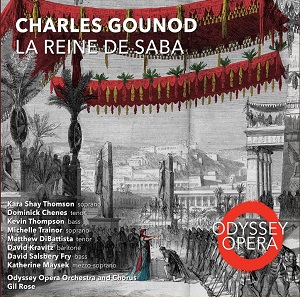La Reine de Saba, eine biblische Geschichte, deren Handlung aus Nervals Voyage en Orient übernommen wurde, erzählt von der vereitelten Liebesbeziehung zwischen dem Architekten und Bronzemacher Adoniram und der Königin Balkis, die mit König Soliman (Salomon) verlobt ist. Die Uraufführung im Jahre 1862 an der Pariser Opéra war ein totales Fiasko: Trotz vieler Proben und hoher Ausgaben für Bühnenbild und Kostüme wurde das Werk nach 15 Aufführungen abgesetzt. Mehrere spätere Überarbeitungen durch Gounod (insbesondere die Kürzung des vierten Aktes) erklären die Existenz mehrerer Versionen dieses Werkes in 4 oder 5 Akten.
Die in Boston beheimatete und 2013 von einem der initiavfreudigsten Musiker der USA gegründete Odyssey Opera hat das Werk in einer Konzertaufführung in einer restaurierten Fassung gespielt, also so wie Gounod das Werk ursprünglich konzipiert hatte. Das allein ist ebenso bemerkens- wie lobenswert, denn das wieder eigefügte Material stärkt den Zusammenhalt des Ganzen und die Dramatik der Musik, freilich ohne dass sämtliche Schwächen vor allem vom Libretto ausgemerzt worden seien.
Doch Dirigent Gil Rose hat die Führungskraft, den Atem und die Übersicht, um von dieser Oper nicht nur die vollständige Fassung, sondern auch die beste Aufnahme überhaupt zu dirigieren. Chor und Orchester klingen prachtvoll in dieser auch tontechnisch exzellenten, sehr räumlichen Liveeinspielung. Hinzu kommt ein Ensemble, dessen Niveau mich sehr überrascht hat.
Die Rolle des Architekten Adoniram verlangt einen recht dramatischen Tenor mit sicherer Höhe und viel Dynamik. Diesen Erfordernissen wird der junge amerikanische, heute 36-jährige Lirico-Spinto Dominick Chenes mit einer runden, angenehmen und sensiblen Stimme vollauf gerecht. Eine beeindruckende Leistung!
Mit ihrer reichen, angenehm timbrierten Stimme singt Kara Shay Thomson eine auch darstellerisch imponierende Balkis. Ebenfalls passend ist die Besetzung von Michelle Trainor, die mit kräftiger, aber auch sensibler Stimme als Adonirams Lehrling Benoni einen positiven Eindruck hinterlässt. Die weiteren Rollen sind ebenfalls gut besetzt. Einziger Schwachpunkt ist Kevin Thompson als König Salomon: Seine Bassstimme ist kalt und röhrend. Er wäre wohl ein idealer Komtur oder auch Fafner, aber kein Salomon, für den Gounod keine ‘basse profonde’, sondern eine ‘basse chantante’ vorgesehen hatte.
Die amerikanische Einspielung ist also nicht perfekt, aber, wie gesagt, insgesamt doch die beste im Katalog.
La Reine de Saba, a biblical story whose plot is taken from Nerval’s Voyage en Orient, tells of the thwarted love affair between the architect and bronze maker Adoniram and Queen Balkis, who is betrothed to King Soliman (Solomon). The premiere in 1862 at the Paris Opéra was a total fiasco: despite many rehearsals and high spending on sets and costumes, the work was cancelled after 15 performances. Several later revisions by Gounod (notably the shortening of the fourth act) explain the existence of several versions of this work in 4 or 5 acts.
The Boston-based Odyssey Opera, founded in 2013 by one of the most proactive musicians in the U.S., has performed the work in concert in a restored version, that is, as Gounod originally conceived the work. This alone is as remarkable as it is commendable, for the restored material strengthens the cohesion of the whole and the drama of the music, admittedly without eradicating all the weaknesses, especially of the libretto.
But conductor Gil Rose has the leadership, breath and overview to conduct not only the complete version of this opera, but also the best recording ever. The chorus and orchestra sound splendid in this live recording, which is also excellent and agreeably spacious in terms of sound. In addition, there is an ensemble whose level surprised me greatly.
The role of the architect Adoniram demands a rather dramatic tenor with secure high notes and a lot of dynamics. These requirements are fully met by the young, now 36-year-old American Lirico-Spinto Dominick Chines with a round, pleasant and sensitive voice. An impressive performance!
With her rich, pleasantly timbred voice, Kara Shay Thomson sings a Balkis that is also impressive in terms of characterization. With a strong but also sensitive voice Michelle Trainor leaves a very positive impression as Adoniram’s apprentice Benoni. The other roles are also well cast. The only weak point is Kevin Thompson as King Solomon: his bass voice is cold and roaring. He would probably be an ideal Komtur in Don Giovanni or even Fafner in the Ring but not a Salomon, for whom Gounod did not intend a ‘basse profonde’ but a ‘basse chantante’,
So the American recording is not perfect, but, as I said, still overall the best in the catalog.




















